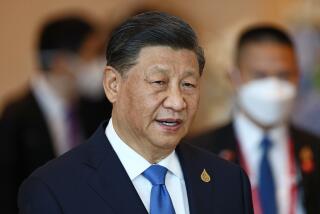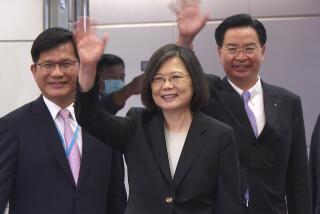Taiwan Relaxes 37-Year Ban on Talks With Peking
- Share via
PEKING — Taiwan suddenly loosened its 37-year ban on any form of contact with China’s Communist regime Tuesday by agreeing to let officials of its national airline negotiate with their Peking counterparts over the return of a plane and crew whose pilot defected to mainland China.
If the negotiations take place as planned in Hong Kong, they would be the first face-to-face talks between emissaries of the Nationalist government in Taipei and the Peking regime since the end of the Chinese civil war in 1949.
For the last several years, China has called for contacts between the two sides as a prelude to reunification. But Taipei, which still claims to be the legitimate government for the mainland, has repeatedly turned down the offers.
Taiwan’s President Chiang Ching-kuo once said that holding peace talks with the Communists would be “tantamount to bargaining with a tiger for its skin.”
Taiwan still prohibits any mail or telephone contact with the mainland, and last year two Taiwan businessmen were arrested and prosecuted in a military court for meeting with Chinese officials to discuss trade opportunities.
Taipei’s announcement of its willingness to sanction the face-to-face contact was worded carefully to make clear that no politics will be discussed and that the meeting should not in any way be considered a first step toward reunification talks.
“This is a single aviation incident, and the talks on the return of the crew, aircraft and cargo will be a business-type discussion between two civil aviation companies,” said China Airlines, Taiwan’s national flag carrier, in a press release.
The sequence of developments that produced Taiwan’s dramatic reversal began May 3, when a China Airlines Boeing 747 cargo plane flying fruit and tires from Bangkok, Thailand, to Hong Kong suddenly landed instead at Canton. The Taiwanese pilot, Wang Hsi-chuen, 57, explained that he wanted to defect to the mainland.
At the time, it seemed like merely one more in what has become a lengthy series of defection incidents involving Chinese and Taiwan pilots. In recent years, the most common type of incident has involved a Chinese air force pilot flying to Taiwan, but the traffic has gone in both directions.
This time, events took some unusual turns.
Two other crew members were on board the cargo plane: co-pilot Tung Kung-shih and technician Chiu Ming-chih. There was no indication that either of them wanted to defect to China, and after the plane landed, they disappeared from sight.
A few hours after the plane landed, the Civil Aviation Authority of China, the mainland’s state-owned airline, sent a telex to Taipei urging that Taiwan’s airline send a representative to Peking to discuss “how to deal with the plane, its cargo and other crew members.”
Last week, a spokesman for the Chinese Foreign Ministry, which ordinarily takes responsibility for reporters’ inquiries on a broad range of foreign and domestic issues, refused to discuss the plane incident, referring all questions to the state-owned airline. That stance reduced the appearance of direct government involvement in the affair.
Intermediary Requested
In Taipei, officials at China Airlines at first refused to heed the call for direct negotiations. They requested permission for Cathay Pacific Airlines, the Hong Kong-based carrier that flies to both Taiwan and China, to act as an intermediary.
The impasse was apparently broken on Monday with a new statement from the civil aviation officials in Peking.
On the one hand, the Chinese authorities remained firm on the subject of handing over the Taiwan plane, crew and cargo. If Taiwan’s airline did not discuss these matters directly with the Civil Aviation Authority of China, the statement said, then the CAAC “should not be held responsible for any delay” in their return to Taiwan.
On the other hand, the new statement from Peking showed new flexibility on where the talks could take place. China abandoned its previous insistence that the talks take place in Peking.
On Tuesday, China Airlines in Taipei responded that it would be willing to have its representatives in Hong Kong meet with CAAC’s Hong Kong representatives.
There has been nothing in Taiwan’s recent history to suggest any reevaluation of its decades-old policy of refusing to allow talks with the mainland.
In March, at a congress of Taiwan’s ruling Nationalist Party, President Chiang, the son of Generalissimo Chiang Kai-shek, told participants: “To defend democracy and freedom, one has to be staunchly anti-Communist. Accordingly, we declare that we will never compromise with the Chinese Communists.”
More to Read
Sign up for Essential California
The most important California stories and recommendations in your inbox every morning.
You may occasionally receive promotional content from the Los Angeles Times.













